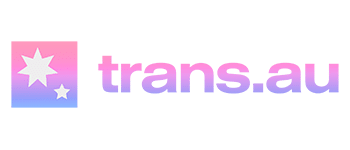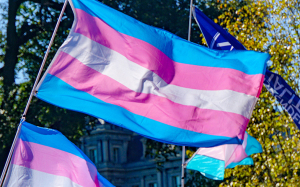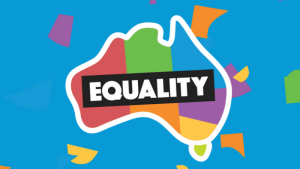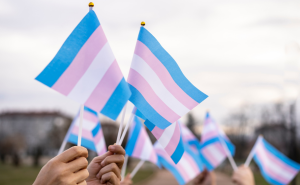This article was originally published by Lucy from Naarm. You can find the original article here.

Anti-transgender activist Jasmine Sussex is currently being brought before the Queensland Civil and Administrative Tribunal, where she is accused of vilification of a transgender woman for claiming that transgender women cannot breastfeed, calling the practice a “dangerous fetish”.
We can reveal that Jasmine Sussex is a known anti-transgender activist, having attended anti-transgender rallies in Melbourne, including the Women Will Speak march in August, where she acted as a rally marshall.
Jasmine was a volunteer counsellor with the Australian Breastfeeding Association until she was let go due to her transphobia. She is also a self-proclaimed breastfeeding expert. Jasmine has claimed in media interviews that she was fired from a volunteer position with the ABA for using the word mother, however, a statement from the ABA says differently, “No breastfeeding counsellor has been, or ever will be disciplined for their use of the word ‘mother’ or ‘mum’ within ABA.”
Jasmine puts forward a bio-essentialist predestined idea of breastfeeding, saying, “Breastfeeding belongs exclusively to Mothers and our babies. If you don’t like this reality, take it up with Mother Nature.”
Jasmine’s point is obviously an attempt at excluding trans women, but also appears to exclude those women who need medical assistance in producing breastmilk. Perceived insufficient milk supply affects 10-25% of mothers2, and studies show that breastfeeding prevents malnutrition, obesity and diabetes, promotes healthy brain development and minimises chances of life‐threatening illnesses.3 It follows that improving access to breastfeeding is critical for improving the health of babies globally.
This brings us to the claim: can trans women breastfeed? Or has the woke alphabet mafia gone too far?
CLAIM: Transgender women cannot breastfeed.

VERDICT: False. Transgender Women can breastfeed.
Cisgender women have often had trouble producing enough breastmilk; as mentioned above, 10-25% of mothers are unable to produce enough breastmilk, and 2-5% of mothers are unable to produce any breastmilk whatsoever.
The World Health Organisation recommends that children initiate breastfeeding within the first hour of birth and are to be exclusively breastfed for the first six months of their lives. According to the WHO, Breastfeeding is one of the most effective ways to ensure child health and survival.
This has led to studies into the production of breastmilk and, ultimately, the formation of medical protocols for inducing lactation in women.
Domperidone is given to women to increase the level of the hormone prolactin, which is involved in milk production. Generally, 10mg of domperidone is administered thrice daily in women until the breast milk supply is well established.4 It is important to note that domperidone allows the brain’s pituitary gland to release prolactin and that domperidone is not a hormone in itself.
Studies have shown that domperidone increases breast milk volume by an average of 88.3ml per day and has shown no adverse effects.5
A study of the breast milk from a transgender woman who underwent successful induction of lactation to breastfeed her infant showed that the breast milk contained “robust macronutrient content”. 6This was to be expected, as a trans woman with healthy developed breasts will have breasts that are biologically equivalent to any other woman, cis or otherwise.
It is true that there is not a significant number of studies on transgender women breastfeeding. However, all the evidence shows that it is safe and effective to use the same protocols for induction of breastfeeding in cis and trans women alike. We do need more research done on trans women’s health, however this does not make the treatment experimental in any sense.
- Header Image Binary Australia. Reproduced under fair dealing for news reporting purposes ↩︎
- The rates and factors of perceived insufficient milk supply: A systematic review – PMC (nih.gov) ↩︎
- Victora, C. G. , Bahl, R. , Barros, A. J. , França, G. V. , Horton, S. , Krasevec, J. , Murch, S. , Sankar, M. J. , Walker, N. , Rollins, N. C. , & Lancet Breastfeeding Series Group . (2016). Breastfeeding in the 21st century: Epidemiology, mechanisms, and lifelong effect. Lancet (London, England), 387(10017), 475–490. 10.1016/S0140-6736(15)01024-7 ↩︎
- Domperidone for increasing breast milk supply (thewomens.org.au) ↩︎
- Domperidone for increasing breast milk volume in mothers expressing breast milk for their preterm infants: a systematic review and meta-analysis – PubMed (nih.gov) ↩︎
- Lactation Induction in a Transgender Woman: Macronutrient Analysis and Patient Perspectives – PubMed (nih.gov) ↩︎
Thanks for reading this article from Lucy from Naarm on Trans.au, subscribe for free to receive new posts directly from me and support my work covering vital LGBTQIA+ news in Australia.
You can find the original article here.





